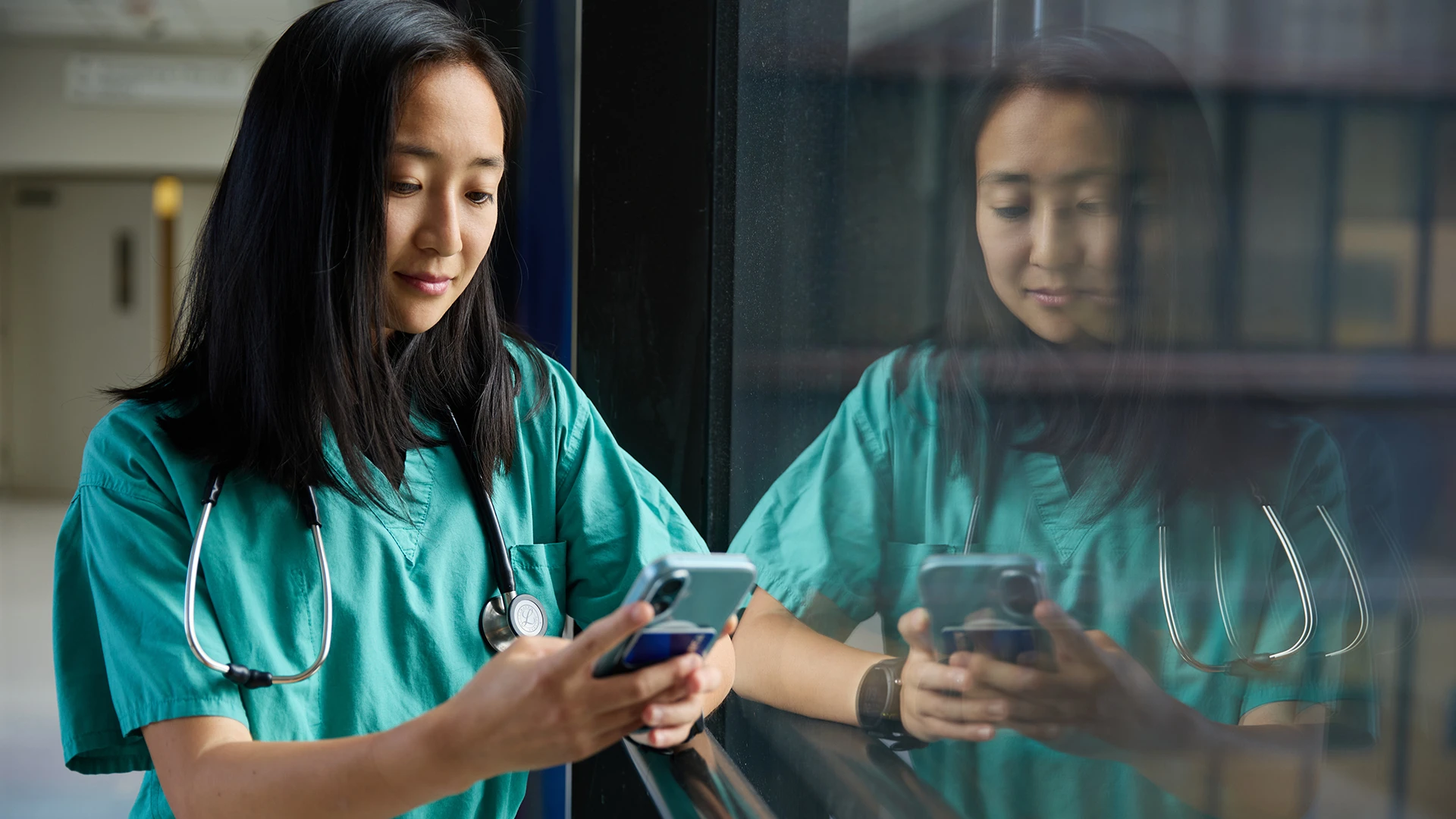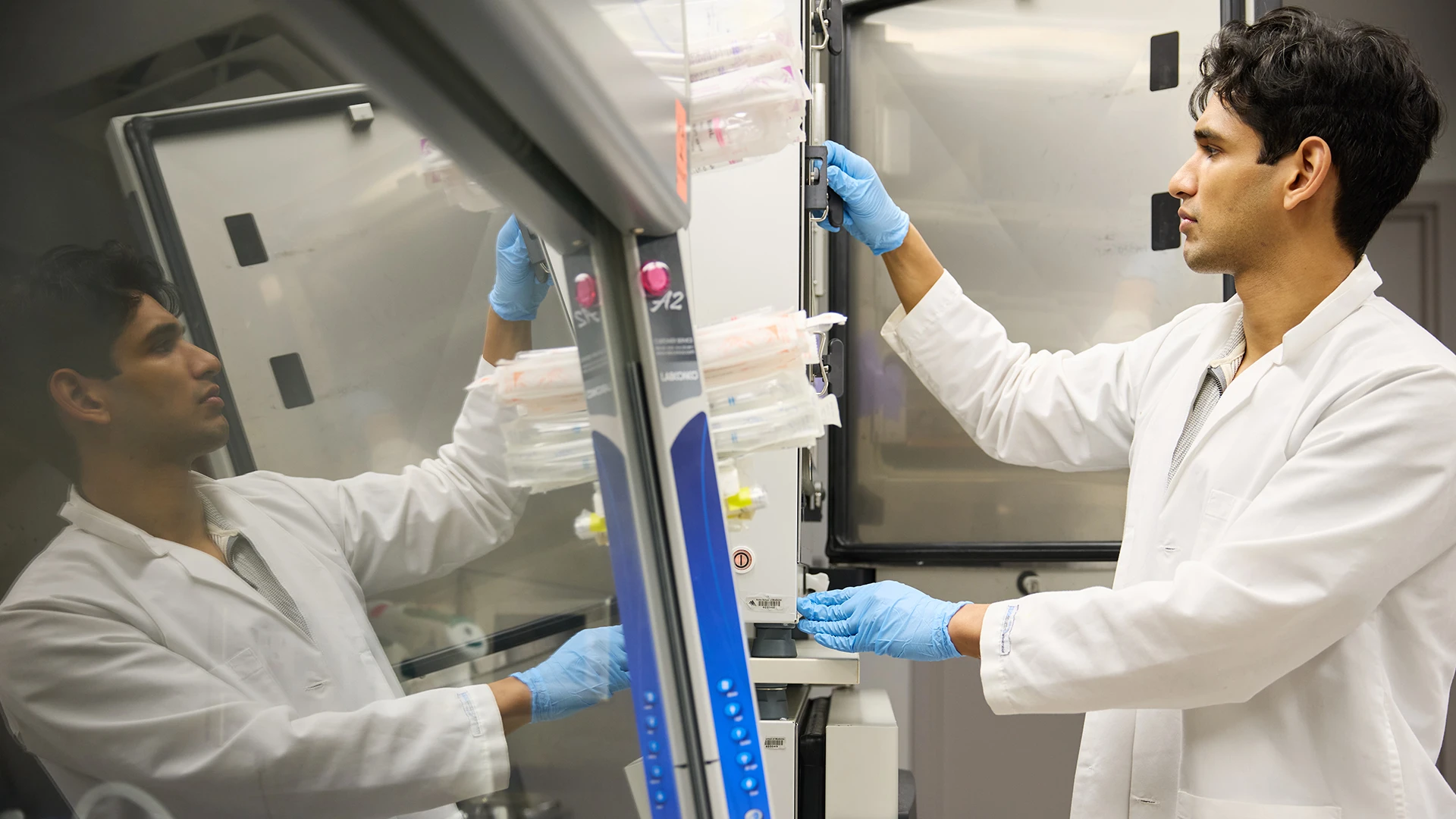In a national first for a medical school, the Icahn School of Medicine at Mount Sinai is providing students with access to ChatGPT Edu—a private, secure, generative AI platform. Medical and graduate students are learning how to engage thoughtfully and critically with this advanced technology as they seek ways to enhance patient care and accelerate scientific discovery.
Joy Jiang, PhD, is part of a new generation of physicians and scientists being educated in the age of artificial intelligence. She recently earned her PhD in Artificial Intelligence and Emerging Technologies in Medicine at the Icahn School of Medicine at Mount Sinai, and she is working on her medical degree.
She is also finding that the new digital tools are dramatically changing her world. In fact, she has published a paper on this timely topic, “Marathon Without a Finish Line: A Learner's Perspective on AI in Medical Education,” in the journal Academic Medicine.
Dr. Jiang welcomes the addition of a tool like ChatGPT Edu.
“If a patient hears that their doctor is using AI, I think that’s cause for celebration, not fear,” says Dr. Jiang, who is also a world-class runner, having finished third among Americans in the 2025 Tokyo Marathon. “It means that all the relevant pieces of information and the latest technology are being leveraged to maximize the patient’s benefit.”
The Icahn School of Medicine announced in May 2025 that it is providing all medical and graduate students, along with select faculty and staff members, access to OpenAI’s ChatGPT Edu—a private and secure platform.
The move reflects Mount Sinai’s commitment to pursuing innovative approaches to education and research through collaborative learning and scholarly inquiry. The Icahn School of Medicine is dedicated to providing students the full benefits of Mount Sinai’s advanced technology infrastructure and vast, diverse troves of data.
The launch follows a formal agreement between Mount Sinai and OpenAI that safeguards patient information in line with the federal Health Insurance Portability and Accountability Act (HIPAA), along with student and other sensitive information, while delivering secure, accessible, and advanced artificial intelligence to the Mount Sinai scholarly community.
With an eye to the future, students are being trained to use the platform as a learning aid and a complement to evidence-based practices, expert guidance, and patient-centered care.
“At Mount Sinai, we believe it’s our responsibility not just to adopt emerging technologies, but to do so with care, purpose, and a strong commitment to equity and academic integrity,” says David C. Thomas, MD, MHPE, Dean for Medical Education at the Icahn School of Medicine. “With robust safeguards in place—including full HIPAA compliance and integrated protections to support safe and appropriate use—our deployment of ChatGPT Edu gives our students the opportunity to engage critically with generative AI.” The goal, Dr. Thomas says, is to help students build the judgment, skills, and ethical grounding needed to become leaders as AI increasingly intersects with medicine.
And there is no doubt that students and faculty will be using AI exponentially going forward, says Dr. Thomas. “So it’s our obligation to prepare them for medicine in the 21st century.”
“At Mount Sinai, we believe it’s our responsibility not just to adopt emerging technologies, but to do so with care, purpose, and a strong commitment to equity and academic integrity,” says David C. Thomas, MD, MHPE, Dean for Medical Education at the Icahn School of Medicine.
The next step will be to evaluate the student experience and how ChatGPT Edu supports learners’ success. “Our EdTech strategy is purposeful innovation,” says Paul Lawrence, Dean for Scholarly and Research Technologies at the Icahn School of Medicine. “We are advancing AI use where it meaningfully enhances teaching, learning, and research, and doing so responsibly within the Mount Sinai Health System.”
Under the guidance of Kris Alpi, PhD, Associate Dean of Libraries and Information Sciences, the Levy Library team at Mount Sinai has developed educational content and workshops to support students, faculty, and staff. This training is designed to aid users in effectively using ChatGPT Edu and integrating AI into academic learning, research, and scholarly activities, according to Marta Filizola, PhD, Dean of the Graduate School of Biomedical Sciences. “We’ve created an infrastructure to increase the visibility of the AI training here at Mount Sinai and give students hands-on experience directly related to improving human health,” says Dr. Filizola, who is also Sharon & Frederick A. Klingenstein-Nathan G. Kase, MD Professor, Departments of Pharmacological Sciences, Neuroscience, and AI and Human Health at the Icahn School of Medicine.
The initial experiences of Dr. Jiang and other students give a glimpse of the many possibilities, as well as the challenges that lie ahead, whether they are using ChatGPT Edu to crunch numbers to find patterns in disease, refine a 40-minute talk for their department, or practice how to explain a diagnosis to a patient.

“If a patient hears that their doctor is using AI, I think that’s cause for celebration, not fear,” says Joy Jiang, PhD, who is part of a new generation of physicians and scientists being educated in the age of artificial intelligence. She recently earned her PhD in Artificial Intelligence and Emerging Technologies in Medicine at the Icahn School of Medicine at Mount Sinai and is working on her medical degree.
Role-Playing and Brainstorming
Having completed two years of clinical training in Artificial Intelligence and Emerging Technologies in Medicine and graduating with her PhD in May 2025, Dr. Jiang has now started clinical clerkships as a third-year medical student. ChatGPT Edu has been “incredibly useful,” says Dr. Jiang, in both the medical domain and in her research.
“Now that I’m doing clinical training again, it’s very helpful to brush up by role-playing patient interviews using ChatGPT’s voice modality feature. I’ll say, ‘Be a patient with a headache,’ and ChatGPT comes up with its own backstory and diagnosis,” Dr. Jiang says. To prepare for patient interactions, she also asks the tool to generate checklists for everything from symptom-specific questions to insurance-required examination steps.
Within Mount Sinai’s secure community platform, users can create and share tailored GPT models for specific tasks. Dr. Jiang has hers quiz her on potential diagnoses and help her create a ranked order of possible diseases. She cross-checks ChatGPT Edu’s suggestions against her own medical knowledge and reviews the primary literature.
In the research domain, Dr. Jiang has found ChatGPT Edu greatly increases her efficiency. “It translates dense scientific language in studies into more comprehensible terms,” she says. “And it can generate experimental options to explore when I’m trying to find creative avenues around obstacles. ChatGPT can help me formulate further hypotheses or suggest next steps for me to consider.”
It has also been a great springboard, Dr. Jiang says. “Because it synthesizes ideas from many different sources, it sparks new project ideas. It’s made me more curious. It gives such comprehensive answers that I want to keep digging and ask more questions.”

"It seems like every day there are 10 new models coming out in the research academic world. ChatGPT can help make sense of this constantly evolving field," says Vivek Kanpa, a PhD candidate in Artificial Intelligence and Emerging Technologies in Medicine. He uses computational genomics and biomedical machine learning to disentangle vast genetic data and track down the sources of chronic diseases such as cancer and diabetes. Click here for details about how comprehensive access to ChatGPT through the Icahn School of Medicine is being used by medical and graduate students, along with some teaching and research faculty.
Staying Abreast of a Fast-Moving Field
One of the advantages of being at Mount Sinai, says Vivek Kanpa, is its embrace of innovative tools and techniques and its integration of digital technologies into the health care ecosystem. As a PhD candidate in Artificial Intelligence and Emerging Technologies in Medicine and a “big numbers guy,” Mr. Kanpa uses computational genomics and biomedical machine learning to disentangle vast genetic data and track down the sources of chronic diseases such as cancer and diabetes.
For Mr. Kanpa, as for Dr. Jiang, ChatGPT Edu functions as both a collaborator and a problem solver, one that’s available 24/7. Particularly useful, says Mr. Kanpa, is its ability to synthesize information. “There's a tremendous amount of literature right now in AI and medicine. It seems like every day there are 10 new models coming out in the research academic world. ChatGPT can help make sense of this constantly evolving field to see where new ‘blue ocean’ strategies can be applied to translate those AI systems into medical practice,” he says, referring to the process of exploring a new and uncontested market space.
For example, Mr. Kanpa was working recently to validate results from an AI model designed to predict whether a genetic mutation will contribute to disease or not. With dozens of other models that could be used for comparison, he faced the daunting task of determining which ones would be trustworthy. “Understanding the inductive biases and a lot of the technical specifications that went into each of these other AI models individually would have taken me ages,” Mr. Kanpa says. “But with the use of ChatGPT, I was able to use the open-source code available from these models, feed that into GPT, and ask it to generate pseudocode for me—like human-language interpretation of what each section of code is doing.”
One of the strengths of AI that drew him in is its ability to connect the dots among different types of data. “Through the history of medicine, we’ve been able to improve how we diagnose, treat, and prevent diseases by recognizing these patterns more and more precisely,” he says. “Discovering these relationships and providing that insight to a physician is the best use of AI and, to a greater extent, GPT models in the health care ecosystem. Ultimately, though, figuring out how things piece together in a larger context is a really human, independent, creative task.”

Ayman Mohammad, a fourth-year medical student, uses ChatGPT Edu to help him explain important concepts to patients. “Medical school mnemonics can be easy to forget because they have no intrinsic meaning, and diagnostic flow charts don’t give you an understanding of their underlying logic,” he says. Click here to read more about how artificial intelligence is reshaping education at Mount Sinai’s Graduate School of Biomedical Sciences.
Looking Behind the Algorithm
A desire to be on the patient side of bioscience led Ayman Mohammad from the business side of biotech into Mount Sinai’s highly selective MD/MSCR (Master’s in Clinical Research) Patient-Oriented Research Training and Leadership program. A fourth-year medical student, he has been investigating innovative treatments for myeloid malignancies (a group of blood cancers), including protein degradation technology, since his first year.
He finds ChatGPT Edu particularly effective in bridging science and communication. He previously used the tool to tailor a 40-minute talk on protein degradation for the Division of Hematology and Medical Oncology. “That’s a very different audience than the biotech business world,” he says.
Mr. Mohammad also uses ChatGPT Edu to help him explain important concepts to patients. “Medical school mnemonics can be easy to forget because they have no intrinsic meaning, and diagnostic flow charts don’t give you an understanding of their underlying logic.” But ChatGPT Edu, he says, is very good at translating these concepts into plain language, which it supports with studies to provide evidence-based explorations of likely diagnoses.
As a volunteer at the East Harlem Health Outreach Partnership, Mount Sinai’s student-run free clinic, Mr. Mohammad says ChatGPT was a valuable tool when he coordinated community-based participatory research. “We always want to be respectful of our patients and ensure that they are also stakeholders in our research,” he says. “ChatGPT was helpful in designing projects that would take into account their concerns and our responsibilities.”
For example, when he has a question, Mr. Mohammad says he comes up with his own answer first, then asks ChatGPT Edu how it could have been better. “It points me to things that I hadn't considered and makes me more reflective,” he says. “At the end of the day, though, it’s on the physician or scientist to retain ownership of the original critical thinking that goes into patient care or research.”
Recognizing Limitations
One of the best-known concerns about AI is its ability to “hallucinate”—to confidently present inaccurate or illogical information as fact. Clearly it is vital to be cautious of this possibility, especially in the clinical context.
“That ChatGPT now cites sources is extremely helpful, but you need to check them,” says Mr. Kanpa. “If it says something is based on the literature, I go and find the study.” Similarly, any possible diagnoses suggested by ChatGPT Edu must be verified, and any code it creates or debugs needs to be evaluated through test cases.
Dr. Jiang notes that her medical school orientation included a discussion about overreliance on AI. “If you just feed all of your questions into ChatGPT, there’s a possibility you won’t retain the information, and you’ll never really learn,” she says. “So especially when it comes to writing and finding my own routes to solving a problem, I always give it my best effort first before turning to ChatGPT.”
Emphasizing Ethics and Equity
The students say they understand the importance of equitable AI use in medicine. Mr. Kanpa notes a recent study in which large language models were shown fictional patient cases that were identical except for the patient’s sociodemographic identifiers (such as economic status, race, and sexual orientation). Changing those sociodemographic identifiers, and nothing else, changed the recommendations AI made, demonstrating how bias can slip into large language models.
To prevent such bias, Dr. Jiang says, “It’s important to build models trained on patient data from diverse populations so the models don’t reinforce any stereotypes or discriminate unfairly. These models need to work for everyone.”
Loss of patient privacy is another possible concern, and one that Mount Sinai takes seriously. A crucial aspect of the agreement with OpenAI, the creators of ChatGPT Edu, is that no data, prompts, or responses entered by students into their ChatGPT Edu accounts will be used to train OpenAI's models. Implementing these guardrails was guided by Mount Sinai’s Research and Education leadership, Cybersecurity, Compliance, and Legal teams, alongside the AI Steering Committee on Teaching, Learning, and Discoveries.
Looking Ahead
Like the other transformational technologies that came before it, ChatGPT Edu is still just a tool, and one that continues to highlight the importance of the human connection in science and medicine.
“This technology isn’t here to replace clinical judgment—it’s here to support it,” says Dennis S. Charney, MD, who initiated and advanced integration of AI at Mount Sinai when he was the Anne and Joel Ehrenkranz Dean at the Icahn School of Medicine and President for Academic Affairs of the Mount Sinai Health System “Students aren’t using AI to make medical decisions, but to sharpen their thinking, challenge their assumptions, and become more confident, critical thinkers. Tools like this can enhance how students learn and problem-solve, but they will never replace human instincts and relationships at the heart of medicine. Our goal is to teach future clinicians and researchers how to work thoughtfully with technology—bringing the best of both worlds together to improve care and advance discovery.”
Adds Mr. Kanpa: “Combined with training on how to use it appropriately and effectively, AI has the potential to benefit both patients and physicians, as well as whole communities that have lacked access to medical care.”
—By Alison Dalton
